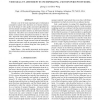Free Online Productivity Tools
i2Speak
i2Symbol
i2OCR
iTex2Img
iWeb2Print
iWeb2Shot
i2Type
iPdf2Split
iPdf2Merge
i2Bopomofo
i2Arabic
i2Style
i2Image
i2PDF
iLatex2Rtf
Sci2ools
128
click to vote
ICIP
2007
IEEE
2007
IEEE
Video Quality Assessment by Incorporating a Motion Perception Model
Motion is one of the most important types of information contained in natural video, but direct use of motion information in the design of video quality assessment algorithms has not been deeply investigated. Here we propose to incorporate a recent motion perception model in an information theoretic framework. This allows us to estimate both the motion information content and the perceptual uncertainty in video signals. Improved video quality assessment algorithms are obtained by incorporating the model as spatiotemporal weighting factors, where the weight increases with the information content and decreases with the perceptual uncertainty. The proposed approach is validated using the Video Quality Experts Group Phase I test dataset.
ICIP 2007 | Image Processing | Quality Assessment Algorithms | Video Quality | Video Quality Assessment |
Related Content
| Added | 03 Jun 2010 |
| Updated | 03 Jun 2010 |
| Type | Conference |
| Year | 2007 |
| Where | ICIP |
| Authors | Qiang Li, Zhou Wang |
Comments (0)

